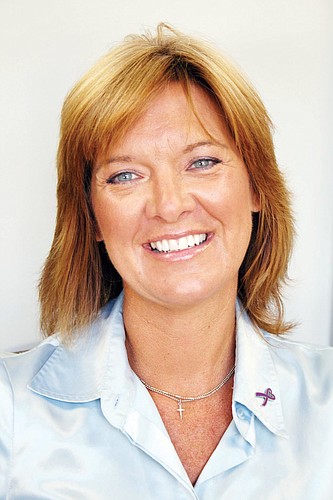- April 23, 2024
-
-
Loading

Loading

Heather Beaven
AGE: 43
FAMILY: married, two daughters
QUIRKY FACT: Her longest surf ride was 1.5 seconds
BIO: Every generation of Heather Beaven’s family has served the country since the American Revolution.
During her naval service, Beaven was a cryptologist who was awarded a Navy Achievement Medal and selected by President Bill Clinton to serve as one of the first 10 female sailors to sail on a combat-ready vessel.
Her husband, Douglas, is an Army Reservist who is set to deploy to Afghanistan this summer. Beaven is a University of Missouri and University of North Florida graduate with a master’s degree in public administration.
In 1997, she was appointed by Kansas Gov. Bill Graves, a Republican, to oversee the Workforce Investment Act, Veteran Employment and Training Services, and other labor and workforce training programs.
Beaven is the CEO of The Florida Endowment Foundation, a nonprofit educational enrichment program that helps 5,000 young Floridians to finish school and learn job skills.
What would you do to balance the budget?
It’s putting the cart before the horse to talk about cutting. ... That’s not to say that there isn’t places we can look at fraud, waste, and abuse, obviously. But to start there is ultimately not going to get us where we need to be in this new and changing economy.
It’s a problem that we have a $1 trillion annual deficit, but I think you can’t cut your way into prosperity. There’s not enough meat left on the bone to cut your way to $1 trillion.
Really, if you look at our obligations, you’re looking at $70 trillion or something like that. So I think it’s a false argument that cutting alone is going to handle this.
And let’s not forget we are at war.
We have obligations that we have to pay for. We decided that seniors are due prescription drug help; we have to pay for that.
We didn’t identify how we are going to pay for that, and we have to now. We decided that for our national security, we needed to go to two different countries and execute two different wars at the same time. We decided that as a country and now we have an obligation to pay for those.
Would you be willing to pledge not to raise taxes?
No. I wouldn’t be willing to take any pledge other than the oath of office to represent my constituents the best I can. But I think to take a pledge before you are privy to pretty significant details — whether they come across your desk or they come across your committee chair — is nonsensical.
If you’re asked to raise the national debt ceiling, how would you vote? What would you propose to reduce the national debt?
My husband’s a member of the 993rd transportation unit, and 250 military families are sending soldiers over in just a matter of days now to Afghanistan for a year, my husband included.
To have this conversation about the debt ceiling again does very little else but to put them in harm’s way. …
What’s best for the nation is the same as what’s best for your family. You’ve incurred debt and you have to pay it off. It’s a matter of honor.
We have allowed Congress to run amuck and to spend and to incur significant amounts of interest, and to borrow from foreign nations that may or may not have our best interests at heart.
Now we have to dig ourselves out of that. …
America has successfully transitioned into new economies before. … If we start turning this conversation to the same conversations we had when we decided to criss-cross the nation with railroads even though we were broke after the Civil War — when we return this conversation to the country that decided that we could build highways and put a man on the moon, then the conversation about the debt reduces itself naturally because we have forever jobs. We have an economy that’s humming. And when you’re making more money, your debt, by definition, reduces itself.
What do you think should be done with the federal tax code? Where do you stand on the subject of a flat tax?
The federal tax code is archaic, cumbersome, and overly complicated, obviously; I don’t think there’s anybody in the world that would argue that.
But the question really is: Do you trust this Congress to address it? They can’t even address the debt ceiling, they can’t address a jobs plan; the idea that this Congress is going to pass a flat tax or a fair tax or any kind of tax reform in any meaningful way is probably not going to happen. …
What are you willing to do to reform Medicaid and Medicare?
I’m going to reject the premise of your question. Are there reforms as far as fraud, waste, and abuse? Absolutely. Are there systems we can put in place to make sure that from both a patient and a doctor and a hospital standpoint that the taxpayer isn’t being taken advantage of? Of course. …
There’s lots of conversation about privatizing Medicare and Medicaid.
Certainly in Florida, there’s even conversation about rejecting federal dollars for low poverty patients.
That’s not who we are.
And as far as details about where the fraud, waste, and abuse lies, it’s pretty clear.
There’s significant reports about over testing and overbilling and all of that kind of stuff. It’s not difficult, but you have to have people on the case.
You can’t prove fraud, waste, and abuse unless you have people investigating and monitoring what’s going on.
If we’re going to have meaningful conversation about fraud, waste, and abuse in Medicare and Medicaid, then we have to be willing to put the resources behind it.